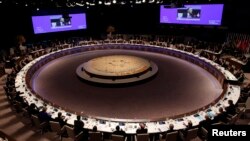Russia has told the United States that it will not attend a 2016 nuclear security summit, the State Department said on Wednesday, in the latest sign of frosty ties between Washington and Moscow.
Explaining why it would stay away, Moscow said it doubted the value of the summit, which is to be held in Chicago in 2016, and believed the views of states which disagreed with the event's organizers would be ignored.
Instead, Russia would focus on a similar conference to be held also in 2016 by the United Nations nuclear body, the International Atomic Energy Agency (IAEA), the Russian Foreign Ministry said.
The bi-annual summit aims to improve nuclear security around the world and, in the past, has involved more than 50 countries including China, France, Germany and Britain.
“Russia delivered a demarche to the United States in advance of last week's preparatory meetings informing us that it no longer planned to participate in the 2016 Nuclear Security Summit,” State Department spokeswoman Jen Psaki said.
On Tuesday, U.S. officials said they regretted Russia's decision not to attend last week's preparatory meetings but they did not disclose the Russian decision to skip the 2016 meeting itself, apparently to give Moscow a chance to change its mind.
The Russian Foreign Ministry said it had informed Washington in mid-October about its decision.
“We regard the recent leaks about [the decision] in the American media as an unsuccessful attempt to put pressure on the Russian side in order to change our position,” the ministry said. “We consider such efforts counterproductive.”
Strained ties
U.S.-Russian ties have been strained by a host of issues, including Russia's annexation of Crimea from Ukraine in March; its suspected military support for separatists elsewhere in Ukraine; and Moscow's 2013 decision to grant temporary asylum to Edward Snowden, a former U.S. government contractor accused of revealing a massive U.S. intelligence-gathering program.
The last nuclear security summit was in The Hague in March, when Russia and the United States set aside their differences over Crimea to endorse the meeting's final statement.
Psaki tried to put the best face on the Russian decision to skip the Chicago summit, a foreign policy initiative of U.S. President Barack Obama that is being held in a city where he has a home and began his career.
“The United States and Russia continue to work productively on nuclear security issues through other channels,” Psaki said.
“In the wake of the Ukrainian situation, we have still cooperated with Russia on issues of nuclear security and non-proliferation as has been visible in our joint efforts on CW [chemical weapons] elimination in Syria and the P5+1 process with Iran,” she added.
The Russian Foreign Ministry said the proposed system of preparation for the summit eliminated the possibility that the opinions of states that do not agree “in everything with the line dictated by organizers” would be taken into account when an action plan for international organizations is developed at the summit.
“We do not see any possibility to take part in the preparations for the Fourth Summit on Nuclear Security,” the ministry said in its statement.
“Instead, we intend to focus on efforts to strengthen cooperation in the framework of the IAEA, in particular on preparations for the next high-level conference [on nuclear security] under the auspices of the Agency, scheduled for 2016.”
The P5+1 group, which includes Britain, China, France, Germany, Russia and the United States, is trying to negotiate an agreement under which Iran would take steps to restrain its nuclear program in exchange for relief from economic sanctions.





